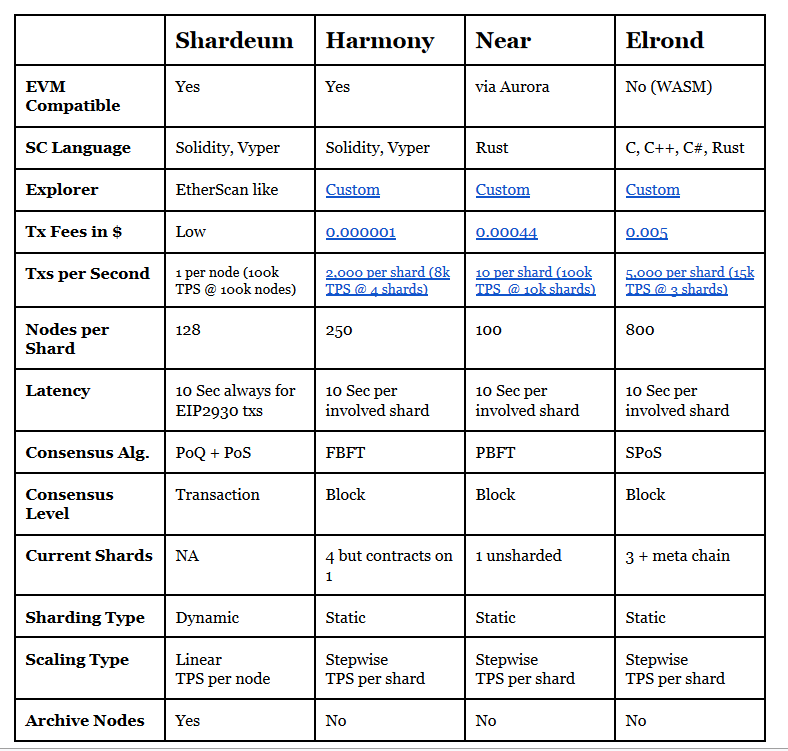Shardeum - EVM based L1 Blockchain using Dynamic State Sharding
- BlockVerse Capital

- May 14, 2022
- 3 min read

Summary
Shardeum is a relatively new layer 1 project getting attention from the crypto world. However, it is actually not new and exists since around 2017. It claims to be the world's first EVM based L1 blockchain that solves scalability trilemma with linear scaling and low gas fees forever. Quick reminder on the blockchain trilemma: three basic concepts security, scalability, and decentralization can't coexist simultaneously for the traditional monolithic blockchains. Only 2 can coexist at the expense of the third, usually scalability.
Shardeum is an Ethereum Virtual Machine (EVM) compatible, smart contract platform which is designed to linearly scale while maintaining true decentralization and solid security through the use of dynamic state sharding
Shardeum is certainly not the first blockchain relying on sharding. Competitors are Harmony (1bn MC) , Elrond (3.7bn MC) and Near (10bn MC). However, key difference is that Shardeum does consensus on each transaction separately, whereas other sharding platforms group transactions into blocks and apply consensus on block level. Shardeum's methodology enables simultaneous processing by these shards, which significantly reduces the time to process the transactions. Also, Shardeum uses dynamic state sharding, and unlike static sharding, dynamic requires requires each node to hold a different address range. therefore, each node automatically increases the TPS (and not each shard)
Advantages:
uses dynamic state sharding, allowing for true scalability
security, immediate finality, low transaction fees, low bandwidth, low latency, high capacity, high fairness, and high throughput
Shardeum will also be able to use Layer 2 solutions to scale further
unlike NEAR or ETH, Shardeum was actually built as a sharding solutions, whereas most other platforms only decided to adapt later.
Technology exists since 2017 and team has been actively developing (more on that below)
Founder is also co-founder of WazirX, the largest Indian exchange.
Ecosystem and community friendly, enabling P2P, DApps, DeFi, NFT, Web 3.0
The underlying technology has been in development since 2016 called Shardus. It provides high throughput, low latency, and immediate finality while still ensuring decentralization and security. Shardus is the software, handling the protocol layer, consensus, sharding etc. Shardeum will use Shardus and add the EVM to the application layer. Shardus is using Proof of Quorum.
Proof of Quorum means to generate a receipt showing that a majority of the consensus group has voted for the transaction. Each node in the consensus group signs the transaction hash and gossips it to other nodes in the consensus group. Nodes collect these votes, and when the number of votes is more than 50%, these votes form a receipt that can prove consensus on the transaction.
see comparison from litepaper with its competitors

Total supply will be 508 million SHM of which 51% will be distributed through node mining. The foundation in Switzerland was incorporated in Q1 and recently they have successfully launched their Alphanet. Mainnet launch and TGE is expected around Q4, Betanet in Q3. Shardeum’s smart contract platforms are deployed in Solidity & Vyper. Faucet is now live as well under https://docs.shardeum.org/basics/faucet
according to a post of the team, they have closed round 1 of 18m and were oversubscribed.
Team
the 2 co-founders are very experienced and successful entrepreneurs in the blockchain space
Nischal Shetty, co-founder: Founder of WazirX, Crowdfire and a steward of the cryptocurrency industry in India
Omar Syed, co-founder: A distributed systems architect with 30 years of experience at NASA, Yahoo, Raytheon and Zynga. Founder of the Shardus Technology
Backers
Shardeum is in the process of raising, as for the time being no backers seem to be announced.
Links






Comments